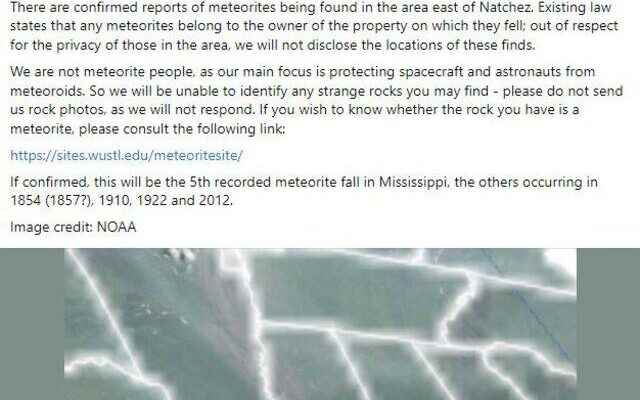When meteorites fall on the earth, some people get excited and hit the road to find a piece of them. However, a statement shared by NASA on Facebook surprised hunters who did not know what to do when they found a rock similar to a meteorite, especially in the USA.
NASA DOESN’T WANT!
According to the news of IFL Science; The latest meteorite, which created a sonic boom in three US states, also revealed meteorites. Some fell, especially on the Mississippi. Finding a piece of space rock that has traveled millions of miles and could be as old as the Solar System can certainly be exciting for the people out there. Moreover, you might think that this would contribute greatly to NASA and therefore to science. But the truth is not like that. Because NASA doesn’t want space rocks.
“PLEASE DO NOT SEND US ROCK PHOTOS”
According to the post shared by the NASA Meteor Watch account on Facebook, some of these recent space rocks have been confirmed in an area east of the city of Natchez and along Highway 84 in Mississippi. However, NASA Meteor Watch made a statement that surprised people. “We are not meteorite people, because our main focus is to protect spacecraft and astronauts from meteorites. Therefore, we cannot detect any strange rocks you may find – please don’t send us rock photos, because we will not respond,” the account said in a statement. So he asked people not to post photos of the rocks they found.
IF YOU FIND IT, YOU ARE THE OWNER…
First of all, it should be said. According to US law, if you find a meteorite on your land, you own it. This means that NASA wants people in pursuit of space rocks to get permission before stepping on a property. However, if a meteorite is found on federal land, government officials consider it to belong to the government, and meteorites found on federal land actually belong to the Smithsonian Institution, according to an interpretation of the 1906 “Antiquities Act.”
National parks and public lands generally prohibit the extraction of rocks (or most natural matter) from them, but the Bureau of Land Management generally allows meteorites to be collected by hobbyists with some limitations.
HAVE A TEST TO BE SURE
NASA Meteor Watch recommends that people use the “Meteorite or Meteowrong test,” designed by Dr Randy L. Korotev of Washington University in St. Louis Washington, which asks people not to send samples until they’re pretty sure they have a real meteorite, to make sure it’s a meteorite.
